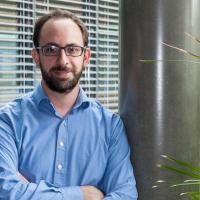
Food, Global Health Reading time 4 min
Harry Sokol, investigator of the role of microbiota in immunity, from patient to cell
Published on 31 October 2016
A career shaped by decisive encounters
It was in high school that Harry Sokol discovered a flair for biology and science, although he was expected to go to Paris’s top business school, HEC. He decided to study medicine, with the intention of becoming a researcher in neuroscience. Somewhere along the line, he realised just how key relationships with patients are. For him, the importance of caring for patients coupled with his passion for inflammatory issues and immunity are what guided him toward research in gastroenterology. The choice was clear when Philippe Marteau, then a pioneer in the medical field in studies on the microbiota, introduced him to Joël Doré (Micalis INRA-AgroParisTech joint research unit), who became his supervisor for his postgraduate degree. From that point on, Harry’s vocation to become a researcher rang loud and clear. Alongside Philippe Langella (Micalis INRA-AgroParisTech joint research unit), he delved into the interactions between the microbiota and its host. In 2008, he identified the anti-inflammatory role of the commensal bacteria Faecalibacterium prausnitzii. This first major achievement was a stepping-stone toward new adventures that led him to Boston, and more specifically the lab of Professor Ramnik Xavier (Harvard Medical School and Massachusetts General Hospital). There, Harry fine-tuned his lab skills in immunology and boosted his knowledge of molecular biology, all the while soaking up all that his excellent environment had to offer in terms of research methods and the reasoning behind scientific projects. “I learned about science there but also a new way of working, of reasoning, of recognising the signs that tell you to keep on going in a certain direction or, on the contrary, to change tack”, he says.
Investigating the role of microbiota in immunity, from patient to cell
Upon his return to France, Harry worked as an associate professor at the Saint Antoine Hospital, where his research project on the role of the microbiota in immunity took shape. The group he led in the Micalis joint research unit in Jouy-en-Josas was carrying out basic research on animals, while his work in the hospital was based on analyses of samples taken from patients. The complementarity between basic research and hospital experience was part of his every day: “When several patients bring up the same symptoms, a doctor stops to think while a researcher proposes hypotheses. Research is therefore directly linked to and fuelled by how a disease is experienced in real life. In return, research encourages us to question the approximation between observations made in animals and what happens in humans. Contact with patients allows us to test hypotheses, or even launch clinical trials”. In collaboration with Joël Doré and Philippe Langella, Harry led the first clinical trial in France on faecal transplants in patients with Crohn’s disease, an initiative which resulted directly from research on the microbiota.
In 2016, while Harry was doing research with Inserm’s Avenir team in connection with the Pierre and Marie Curie University, and with MICALIS, he was awarded a Starting Grant from the European Research Council (ERC). This European funding mounts to 1.5 million euros over five years, and aims to further research on the interactions between the microbiota and the metabolism of tryptophan, an amino acid that is an essential precursor for several molecules that have a broad range of impact on health, from bowel inflammation to neuropsychiatric disorders.
The dream: help patients with inflammatory bowel disease
Through his double vocation, Harry strives to build a bridge between basic research on the microbiota and treatment for patients with inflammatory bowel disorders, and especially Crohn’s disease. That is the crux of his work, which could ultimately lead to using micro-organisms from the intestines, or the molecules they produce, to treat alterations of the microbiota in sick patients, or better yet, prevent the onset of a disease thanks to targeted intervention in the first weeks or months of life. In five to ten years, this dream may well become a reality. An innovation that the researcher, with many strings to his bow, intends to pursue in order to bridge the gap between patient and cell, test tube and drug.
- 2007: Doctor of Medicine, specialty in hospital care: hepatology and gastroenterology, Faculty of Medicine Paris 5, Université Paris Descartes
- 2008: Doctor of Science, specialty in microbiology, Faculty of Science Orsay campus, Paris-Sud University, Paris-Saclay University
- 2009-2011: Post-doctoral research, Massachusetts General Hospital & Harvard Medical School
- 2011: Associate Professor in Gastroenterology, Saint Antoine Hospital, gastroenterology; researcher, team Avenir: microbiota and immunity, U1157 Inserm/ CNRS joint research unit 7203
- From 2013: Head of Microbiota and Immunity group, Micalis INRA-AgroParisTech joint research unit
- From 2016: Professor of Gastroenterology, Saint Antoine Hospital, gastroenterology
